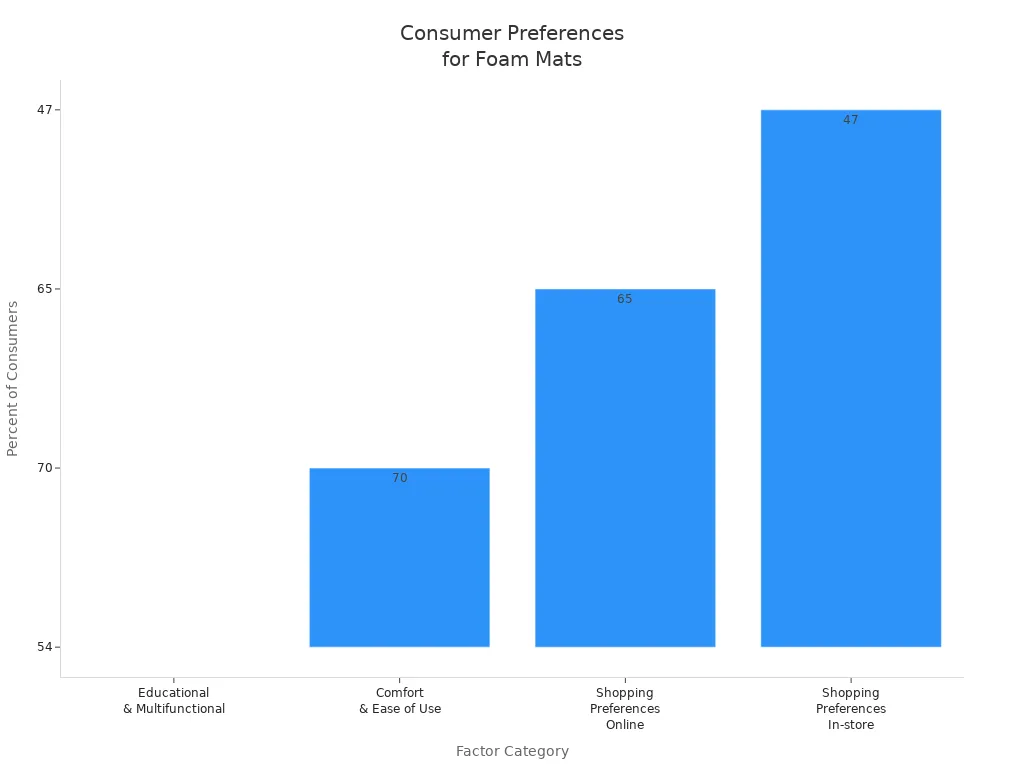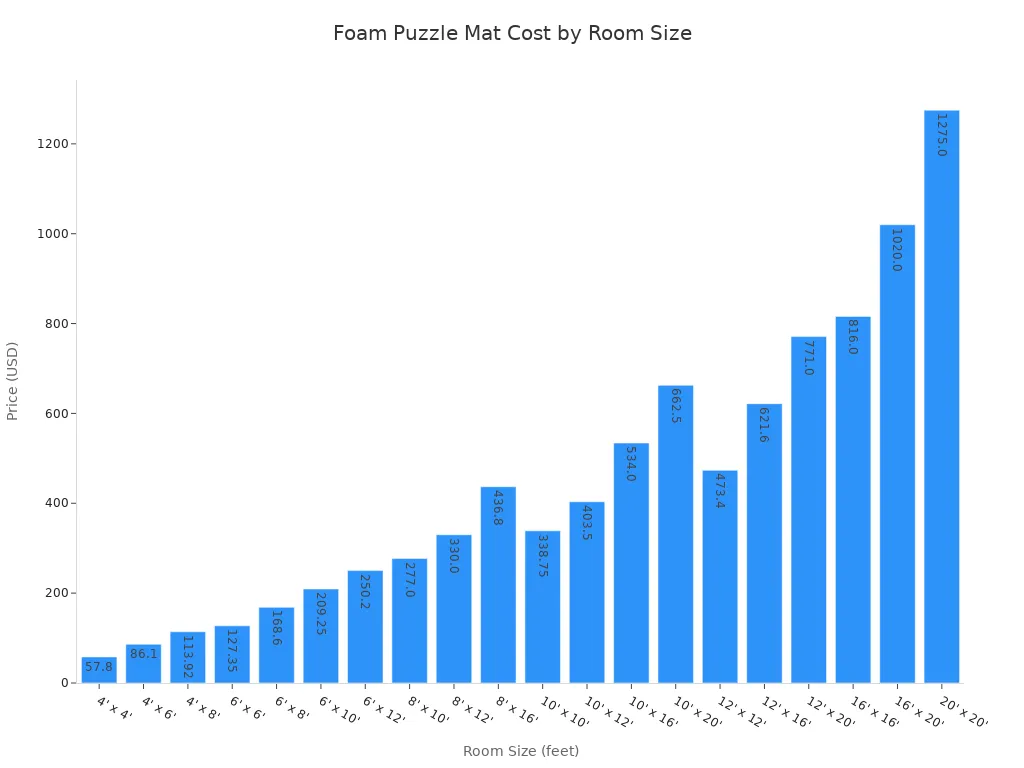Views: 0 Author: Site Editor Publish Time: 2025-08-15 Origin: Site








Maybe foam puzzle flooring mats are right for you, or maybe not. You might like how soft they feel and how they absorb shocks. This is good if you sit on the floor a lot or want a safe spot for kids. Many people care about safety, being eco-friendly, and easy cleaning. Here is what most shoppers look for:
Factor Category | Key Consumer Preferences / Findings |
|---|---|
Safety & Health | Non-toxic, BPA-free, hypoallergenic materials; safety certifications matter. |
Comfort & Ease of Use | Thicker mats and portability stand out. |
Environmental Concerns | Eco-friendly, recycled foam reduces carbon footprint. |
Educational & Multifunctional | Sensory textures and interactive features help child development. |

Think about what is most important for your space. Do you want a Foam Puzzle mat with bright colors? Or do you want a Foam Folding Play Mat that is easy to put away? What you care about most will help you choose the best one.
Foam puzzle mats give soft floors. They help protect you from falls. They also help you feel less tired. This makes them good for kids, exercise, and play spaces.
These mats are simple to put together. You can move them easily. The pieces fit together without tools. This is great for people who rent homes. It is also good for anyone who likes to change their room.
Safety is important. Pick mats made from safe foam. Make sure they do not have BPA. Look for mats that do not slip. Check for safety labels to keep your family safe.
Cleaning is easy. Sweep the mats often. Wash them gently. Let them air out. This keeps the mats clean and helps them last longer.
Foam mats are comfy and can bend. But they might wear out after some time. They can move around on some floors. Check them often and put them in the right spot. This helps keep everyone safe.
You might wonder if Foam Puzzle mats fit your lifestyle. These mats work well for many people. Parents love them because they create a safe and soft play area for kids. If you rent your home, you can use these mats without making permanent changes. Homeowners often choose them for basements or rooms that need extra comfort. Fitness fans use them in home gyms for exercise and stretching. Martial arts students also benefit from thick, non-slip mats during training. You can even use them for temporary events or pop-up spaces. The mats come in many styles, so you can pick what matches your needs.
Tip: If you want a floor that you can move or change easily, Foam Puzzle mats are a smart choice.
Where should you put Foam Puzzle mats? Interior design experts suggest several places:
Kids’ playrooms or nurseries, where safety and easy cleaning matter most.
Home gyms, living rooms, bedrooms, or garages, for exercise and multipurpose use.
Indoor playgrounds, which need shock absorption and water resistance.
Martial arts training areas, where thick padding and grip help prevent injuries.
You can also use these mats for yoga, baby crawling, or learning activities. Some mats have letters and numbers to help kids learn while they play. You will find options like folding mats, roll-up mats, and wall stickers. The variety means you can use them for play, workouts, or even as a quick flooring fix. If you want comfort, safety, and flexibility, these mats fit almost any space.

You want your floor to feel soft and comfortable, right? That’s where Foam Puzzle mats really shine. These mats use EVA foam, which gives you a gentle, springy surface. You can sit, kneel, or play on them for hours without feeling sore. If you stand a lot, you’ll notice less tiredness in your legs and feet. The thickness of the mat makes a big difference in how much comfort you get. Here’s a quick guide to help you choose:
Thickness | Description & Comfort Features |
|---|---|
1/4 inch | Good for light use, like under desks or in packing areas. Offers basic cushion and slip protection. |
1/2 inch | Great for playrooms and home gyms. Dual-density foam gives you more support and helps fight fatigue. |
3/4 inch | Even more comfort and memory. Works well in wet or dry spaces and is easy to clean. |
1 inch | Super thick and sturdy. Perfect for heavy-duty use, like in garages or for martial arts. Keeps you safe and comfy. |
You can pick the thickness that matches your needs. Thicker mats give you more protection and feel softer underfoot.
Safety always comes first, especially if you have kids or pets. Foam Puzzle mats use non-toxic EVA or PU foam. These materials are free from harmful chemicals like BPA, phthalates, and heavy metals. Some brands even air out their mats before packaging to cut down on any chemical smells. You can trust that these mats meet strict safety standards in the US, UK, and EU.
You also get slip resistance, which helps prevent falls. The mats absorb shocks, so if someone trips or drops a toy, the floor stays safe. Many mats are hypoallergenic, so they won’t bother sensitive skin. If you care about the planet, you’ll find eco-friendly options that avoid harmful additives. Some mats even use recycled foam to lower their carbon footprint.
Note: Always check for safety certifications when you shop for Foam Puzzle mats. This gives you peace of mind.
Setting up Foam Puzzle mats feels like putting together a giant jigsaw puzzle. You just snap the pieces together, and you’re done. No glue, nails, or tools needed. If you want to cover a big area, just add more pieces. If you need to move or store them, pull them apart and stack them up. This makes them perfect for renters, event spaces, or anyone who likes to change things up.
You can also customize the look. Mix and match colors or patterns to fit your style. Some mats have fun designs, letters, or numbers for kids. You get a floor that fits your space and your taste.
Keeping your Foam Puzzle mats clean is easy. You don’t need fancy cleaners or special tools. Here’s how you can keep them looking fresh:
Sweep or shake out crumbs and dirt every day.
Use a vacuum with a brush attachment to get dust out of grooves.
For small stains, make a paste with baking soda and water. Dab it on, then wipe clean.
Disinfect weekly with a gentle, phosphate-free cleaner or a vinegar-water mix (1 part vinegar to 4 parts water). This kills germs without harsh fumes.
For tough stains, try a little hydrogen peroxide. Test a small spot first to make sure it won’t fade the color.
Always dry the mats well. Air them out or use a dry cloth to stop mold and mildew.
Take the mats apart sometimes to clean between the pieces.
Don’t put the mats in the washing machine. The foam can break down if it gets tossed around too much. Stick to gentle hand cleaning, and your mats will last longer.
Tip: Regular cleaning keeps your mats safe and looking new, especially in playrooms or gyms.
You want your mats to last, but foam tiles can show wear over time. You might notice erosion, cracking, or curling at the edges, especially if you use them every day. Some mats flatten or even bloat, making the surface uneven. This can create slip or trip hazards. Most foam mats come with a one-year warranty, but with good care, they can last up to ten years. Specialty athletic mats sometimes last even longer. If you use mats in a gym or playroom, heavy furniture or moisture can shorten their lifespan. High-density EVA foam mats resist damage better, but all mats need regular cleaning and careful use to stay in good shape.
Tip: Check your mats often for signs of damage. Replace any tiles that look worn or unsafe.
Foam mats offer lots of color choices. You can mix and match up to 15 bright colors for kids’ rooms or pick textured tiles for gyms. Many mats are reversible, so you get two looks in one. You can create custom designs by swapping tiles or adding border strips for a finished edge. Even with all these options, foam mats may not match the style of hardwood or carpet. They can get cosmetic damage from pet nails or heavy use. If you want a sleek, classic look, foam mats might not fit your style.
Feature | Foam Mats | Traditional Flooring |
|---|---|---|
Color Variety | High | Low |
Design Flexibility | High | Medium |
Durability | Medium | High |
You care about safety, especially for kids. Foam mats often use PVC, polyurethane, or EVA foam. Some of these materials contain chemicals like phthalates, formamide, or flame retardants. These can cause health problems, especially for babies and toddlers. Some mats release fumes or microplastics, which children can inhale or touch. Safer mats use organic cotton, natural rubber, or cork. Always check labels and choose mats marked non-toxic or formamide-free. Some countries have banned certain chemicals in foam mats, but not all brands follow strict rules.
Note: Air out new mats before use. Look for safety certifications to lower health risks.
Foam mats sometimes slide or buckle, especially on carpet or small areas. You might see tiles shift when you walk or play on them. Buckling happens if you install mats wall-to-wall without leaving a gap. To fix this, leave a 1/4 inch space at the edges. For small mats, butt them against walls or use a non-skid rug underneath. High-quality mats with textured undersides stay in place better. Most experts don’t recommend glue or tape, since mats are designed to interlock. Some mats come with slip-resistant backing for extra grip.
If your mats move too much, try repositioning them or adding a non-skid layer below.
When you pick flooring, you want the best choice. Foam Puzzle mats are one option. Let’s see how they compare to other types.
Rubber mats are very strong. You can drop weights on them. They do not break or bend easily. These mats work well in home gyms. Foam Puzzle mats feel softer and cost less money. But they do not last as long if you use them a lot.
Feature | Foam Mats | Rubber Mats |
|---|---|---|
Durability | Lightweight, flexible, but less durable; may compress or indent over time | Extremely durable; suitable for heavy equipment and high-impact use |
Comfort | Soft, cushioned surface ideal for yoga, cardio, and floor workouts; easy to install | Dense but cushioned; provides shock absorption for intense workouts |
Cost | Generally lower cost; available in many colors and designs | Higher cost due to material and durability; long-term investment |
Rubber mats do not soak up water. You can clean them fast. They might smell at first, but the smell goes away. Rubber mats are heavy and hard to move. Foam Puzzle mats are light and easy to set up. You may need to buy new foam mats more often.
Carpet tiles look warm and cozy. You can cut them to fit any room. Both carpet tiles and Foam Puzzle mats are simple to install. You can clean them with a vacuum or a wet cloth. Foam Puzzle mats give more cushion and protect you from falls. Carpet tiles feel soft but do not stop injuries as well.
Aspect | Foam Puzzle Mats | Carpet Tiles |
|---|---|---|
Installation | Quick and easy due to interlocking puzzle-piece design; minimal tools or expertise needed | Easy to install; interlocking squares can be custom cut to fit any space |
Maintenance | Waterproof, stain resistant, easy to clean with vacuum or damp mop | Waterproof, odor proof, stain and damage resistant; vacuum for cleaning; can be dried if wet |
Safety | Excellent impact absorption and cushioning; reduces injury risk; provides thermal insulation and noise reduction | Provides anti-fatigue and insulative properties similar to traditional carpet; less cushioning and shock absorption compared to foam mats |
Replacement | Easy removal and replacement of damaged sections | Easy removal and replacement of damaged sections |
Here is a chart that shows Foam Puzzle mat prices for different room sizes:

Hardwood and tile floors look nice and last a long time. They do not make falls softer or keep rooms quiet. Foam Puzzle mats help make playrooms safer and quieter. They keep rooms warm in winter and cool in summer. You can clean them quickly and change out broken tiles.
Foam mats soak up sound and keep things quiet.
They help protect kids from bumps and falls.
You can clean them fast and swap single tiles.
You do not need tools to put them in.
If you want comfort, safety, and easy cleaning, Foam Puzzle mats are better than hard floors for play areas and gyms.
Before you buy, take a moment to ask yourself a few important questions. These will help you figure out if these mats fit your space and needs:
What will you use the mats for? (Kids’ room, exercise area, basement, or something else?)
Which type of foam works best for your plans? Think about how tough and versatile you need it to be.
How much space do you want to cover? Remember, the puzzle edges mean you might lose a little area.
Do you need mats that are waterproof or can handle spills?
How thick and dense should the foam be for safety and comfort?
Will temperature changes in your room cause the mats to buckle or shift?
Do you want to use the mats outside sometimes?
What kind of installation do you prefer? Can you swap out single tiles or finish the edges neatly?
Would you rather have mats you can move or remove easily, without glue or tape?
Is it important that one person can carry and set up the mats alone?
Tip: Write down your answers. This makes shopping much easier!
Here’s a quick look at the main ups and downs. This table can help you decide fast:
Pros | Cons |
|---|---|
Soft and comfy underfoot | Can wear out with heavy use |
Easy to install and move | May not match all room styles |
Good for safety and shock absorb | Some mats have chemical smells |
Simple to clean and maintain | Can shift or slide on some floors |
Many colors and designs | Not as durable as hard flooring |
Note: If comfort, safety, and easy setup matter most to you, these mats might be a great fit.
Choosing the right flooring can feel tricky, but you have lots of options. Think about what matters most for your space. Here are some key things to consider:
What activities will you do on the mats?
Do you need easy setup and cleaning?
How much comfort and protection do you want?
What is your budget?
Factor | Why It Matters |
|---|---|
Size & Shape | Make sure the mats fit your room and look good. |
Material | Pick foam for softness and water resistance. |
Durability | Choose thicker mats for more support and safety. |
Try a sample mat or write down your top needs. Got questions or tips? Drop a comment below—I’d love to hear from you!
You can place a non-slip rug pad or gripper sheet under your mats. This helps them stay in place, especially on smooth floors. Some mats come with textured bottoms for extra grip.
You can use them outside for short periods. Keep them out of direct sunlight and rain. Foam mats may fade or break down if left outside too long.
Most foam mats use non-toxic materials. Always check for safety labels like BPA-free or formamide-free. Air out new mats before use. This helps remove any leftover smells.
You can sweep or vacuum them every day. For stains, use a damp cloth with mild soap. Avoid harsh chemicals. Let the mats dry before putting them back together.
Versatile Uses of Tatami Puzzle Mats: The Perfect Choice for Yoga, Play Areas, and More
The Benefits of Using Printed Foam Puzzle Mats in Home And Play Spaces
Choosing The Right Printed Foam Puzzle Mat for Your Child’s Room
Transform Your Playroom: Innovative Designs with Cutout Foam Shape Floor Puzzle Mats
Why Interior Designers Love Cutout Foam Shape Floor Puzzle Mats for Kids' Rooms
Eva Foam Plain Color Puzzle Mats: The Professional's Choice for Home Gyms